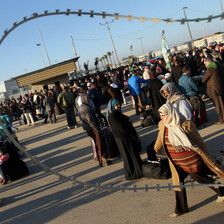The Electronic Intifada Rafah 18 June 2015

Palestinians queue at the Rafah crossing on 14 June.
APA imagesFahad stood on his crutches at the Rafah terminal, the border crossing between Gaza and Egypt, his right foot swaddled in bandages. He waited for his name to be called.
Fahad, a 27-year-old man from the northern town of Beit Hanoun, is one of more than 3,000 Palestinians hoping to cross into Egypt to receive medical care that is unavailable in Gaza.
Fahad’s right leg was seriously injured when it was hit by shrapnel during Israel’s assault last summer. At the time, he was rushed through Rafah to receive care in Egypt. But once he returned to Gaza he was unable to get the necessary follow-up treatment.
Now Fahad, who did not want his last name printed, has been told by his doctors in Gaza that the only option they can provide him is amputating his leg.
Egypt has kept the Rafah crossing — the only crossing point for the vast majority of Gaza’s 1.8 million residents — almost entirely sealed for more than seven months. Egypt’s president Abdulfattah al-Sisi closed Rafah last October following attacks against the Egyptian military in the Sinai Peninsula.
The crossing has been opened for travel in both directions for a mere five days since that time. When Egypt recently announced it would open its gates for three days only, the list of Palestinians waiting to leave had swelled to 15,000.
Gaza’s health care system has been severely restricted since Israel and Egypt closed Gaza’s crossings after Hamas was elected to power in 2006 and took control of the Strip’s internal affairs in 2007. Even before the siege, Palestinians in Gaza relied on traveling abroad to receive specialized treatment.
But for the last eight years, patients in Gaza have found it increasingly difficult, if not impossible, to receive a medical permit to exit.
Fees to leave first
Students, people with certain medical conditions and Palestinians with citizenship abroad are able to register with the interior ministry in Gaza for an exit permit. When Egypt opens the crossing, the ministry publishes the names of those who will be allowed to exit on its website.
According to Gisha, an Israeli group that monitors the freedom of movement for people in the Gaza Strip, a special committee within the interior ministry determines and prioritizes the urgency of needs — not all of them medical — and places those deemed most pressing on the first buses.
But the scores of people seated at the Rafah crossing late afternoon Monday said it is those who have paid a handsome fee to Egyptian authorities who are able to leave first.
“I don’t have the money to pay the authorities of Egypt,” Fahad said. He was supposed to cross on Sunday.
Fahad estimated that those who were allowed to cross first paid as much as $4,000.
Only two years ago, according to Gisha, it cost Palestinians around $100 to coordinate with the Egyptian authorities. But with an increasingly dangerous political climate in Egypt for Palestinians and the greatly reduced frequency of border openings, the cost has spiked.
Since al-Sisi became president of Egypt, people now pay up to $1,000, according to Isra al-Modallal, a journalist and former spokesperson for the Hamas-led government. But al-Modallal says that number can get even higher.
“People don’t want to wait and miss their chance to exit now that the border is never open,” al-Modallal told The Electronic Intifada. “People don’t know when it will be open next.”
Brutal crackdown
Al-Sisi has since extended the opening of Rafah for an additional four days. Of the 15,000 people trying to leave this week, only 1,850 had passed through in the first three days.
According to statistics compiled by Gisha, after Egypt’s democratically elected president Muhammad Morsi was overthrown in the summer of 2013, the number of people permitted to cross via Rafah dropped dramatically.
In the first half of 2013, an average of 20,348 people exited Gaza via Rafah every month. In 2014, that monthly average plummeted to 3,120 — a reduction of 85 percent.
This week’s opening of the crossing has led some observers to foresee a warming of relations between Hamas, a nationalist movement that has historical roots in Egypt’s Muslim Brotherhood, and al-Sisi, whose government has enacted a brutal crackdown on that party since coming to power.
The Rafah terminal displays the damage it suffered during last summer’s war. The plastic chairs are cracked, the paneled ceiling punched with holes from which cords and wires dangle. Food and drink vendors swarm around people who sit waiting, stoically, food wrappers scattered around their feet.
Families with large suitcases optimistically stuffed, lone Egyptian citizens who got trapped in Gaza and groups of bored men and women all wait in the heat for their names to be called.
An announcer comes on the loudspeaker and says the next bus will carry those who have “coordinated with Egypt.” Most of the people waiting remained seated.
Ahmed Ismail al-Hajouj was traveling with his wife, Camila, who has been waiting months for a kidney transplant. Eight months ago the doctors said the surgery was urgent.
Now she lay on the ground, appearing to sleep. But her husband explained that she is not sleeping. In preparation for her day of travel, she had stopped taking her medication because it makes her need to use the bathroom every five minutes. And when Camila stops her medication, she falls into a coma-like state.
“The people who coordinate with Egypt go first,” Ismail said, angrily. “We coordinated with the Ministry of Health but all they do is give you a piece of paper.”
Charlotte Silver is a journalist based in San Francisco. Twitter: @CharESilver





